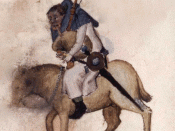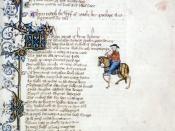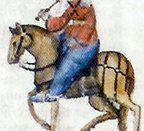In what light does Chaucer represent marriage in The Canterbury Tales? Refer to at least three tales in your answer.
I am going to write about the subject of marriage in the Wife of Bath's Tale; the Merchant's Tale and The Miller's Tale.
I will begin with the Wife of Bath's Tale. The title in itself is important, as Chaucer does not use her job title but her marital identity. This is perhaps the first clue about the subject of the tale (and indeed the long autobiographical prologue). Marriage as we will soon learn is in fact Alisoun's profession and this is how she earns her money. In Medieval times women were classified in terms of their sexual and marital status. It is befitting that a woman should have her say first on the subject of marriage.
In the Prologue Alisoun tells us that she has been married five times, her first marriage began at the age of twelve.
This creates sympathy for her and helps us to empathise. Alisoun does not see marriage as a vow of love and obedience but she brags about how she makes her husbands work at night to pay off the marriage 'dette'.
"As help me God, I laughe when I thynke
How pitously a-nyght I made hem swynke"
Alisoun is a stereotypical young and wild wife with her older rich husbands, whom she plays for money and she conforms to literary convention by her behaviour. Alisoun defends her actions making good use of anti feminist literature. She denounces Christianity, saying that God gave humans a body to us as they see fit. She is very cynical about the church and repudiates its teachings but later relies upon biblical figures to support her conduct.
"I woot wel Abraham was an hooly man.


